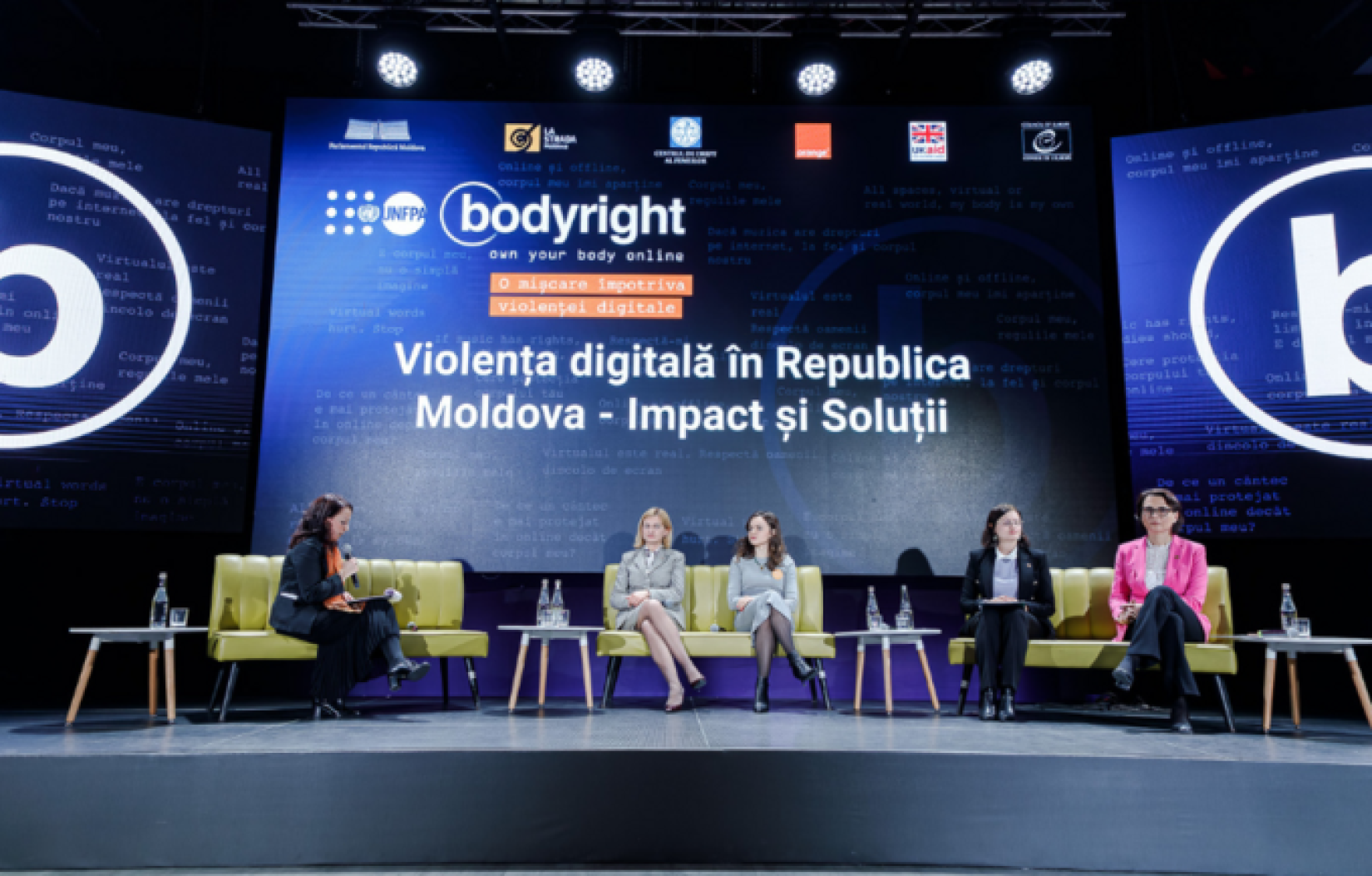National commitments to adjust legislation and combat digital violence in the Republic of Moldova
19 December 2023
- In the age of information technologies, the phenomenon of online violence has become an increasingly urgent concern. The Republic of Moldova, like other states, faces challenges in combating this type of virtual aggression. In recent years, the intensity and variety of online attacks has increased considerably, affecting not only individuals but also entire communities.

At the launch event of the global "Bodyright" campaign in the Republic of Moldova, organized in November, decision-makers, civil society and international partners recognized the seriousness of online violence, taking firm actions to regulate the legislative framework and develop implementation mechanisms, so that the online environment becomes safer, and young people and women are protected from violence.
Elena Botezatu, Executive Director of La Strada International Center, mentioned that violence facilitated by technology happens more often than we imagine. Practically every second case of domestic or sexual violence reported by a woman or girl to the hotline managed by the La Strada Center was committed with the use of information technologies and social networks.
„Unfortunately, there are several legislative loopholes that prevent the successful resolution of such cases. Today, online sexual blackmail or online persecution, including the publication and distribution of content with sexual images of women for derogatory purposes, are not actions expressly provided in the legislation of the Republic of Moldova. Most of the time, the professional response in such cases is to contact the perpetrator and ask them to delete the images from the pornographic websites, while the victim is asked to gather evidence and prove that the person published the information. There is definitely a need for a lot of information and public education in this area, as well as legislative levers and tools for reporting and intervention, to be able to remove illegal content from the online environment and hold abusers accountable”, said Elena Botezatu.
Daniella Misail-Nichitin, State Secretary at the Ministry of Internal Affairs, mentioned that in the Republic of Moldova some measures are already being taken in this direction.
„The Ministry of Internal Affairs has initiated a draft law to adjust the provisions of Law No. 20 regarding the prevention and combating of digital crime. This will allow us to intervene much more quickly to stop web pages promoting illegal and harmful content, such as child or adult sexual abuse. Also, some provisions of the Criminal Code have been revised and include criminal liability for the dissemination of information of a sexual nature, including images and video recordings that are distributed for the purpose of revenge, hatred, humiliation or damage to the dignity and honor of the person. Likewise, the Crime Prevention and Combating Program for the years 2022-2025 envisages several actions to combat cybercrime, including online sexual abuse”, she said.The legal framework must be perfected, but it is equally important to ensure its practical implementation. Moving forward, it is necessary for reporting mechanisms to be as close as possible to citizens and to create subdivisions specialized in identifying and combating cybercrimes, including those related to digital violence, in other police entities in the country, not just at the central level. This requires continuous training of specialists, as digital technologies evolve at a rapid pace”, said Daniella Misail-Nichitin.
On her end, State Secretary Felicia Bechtoldt assured that the Ministry of Labor and Social Protection is also making efforts to combat this phenomenon.
„On the digital dimension, we have included extensive actions in the Program for preventing and combating violence against women and family violence, and we are going to develop changes in the normative and operational framework, aimed at areas of preventing and combating digital violence. These concern both adjusting the legislative framework and training specialists in various fields, to increase their resilience and ability to respond to violence facilitated by technology”, said Felicia Bechtoldt.
Present at the discussions, Doina Gherman, Deputy in the Parliament of the Republic of Moldova, President of the Foreign Policy and European Integration Commission, confirmed that the phenomenon of digital violence is growing and firm response actions are needed.
„Digital violence, unfortunately, can take many forms, such as cyberbullying, non-consensual use of intimate images and, last but not least, hate speech, which is now much more present and aggressive online. The law on combating and preventing violence against women requires changes on the dimension of digital violence. We need to create a working group to adjust the regulatory framework and come up with clear implementation mechanisms”, said Doina Gherman.
The deputy thanked UNFPA and the partners involved for starting the „Bodyright” campaign and other actions that support the fight against digital violence in the Republic of Moldova. „We are starting a very important and good movement for all of us as a society, and I have every conviction that we will succeed”, concluded Doina Gherman.



